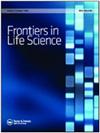Antioxidant, antiproliferative, genotoxic and cytoprotective effects of the methanolic extract of Padina tetrastromatica on human breast adenocarcinoma and embryonic fibroblast cell lines
Q1 Biochemistry, Genetics and Molecular Biology
引用次数: 8
Abstract
The in vitro antioxidant, antiproliferative, genotoxic and cytoprotective effects of the methanolic extract of the seaweed Padina tetrastromatica were assayed using the 1,1-diphenyl-2-picrylhydrazyl (DPPH) radical, superoxide, nitric oxide and hydroxyl radical scavenging assays, 3-(4,5-dimethylthiazol-2-yl)-2,5-diphenyltetrazolium bromide (MTT) and comet assays. The methanolic extract of P. tetrastromatica showed considerable antioxidant activity through inhibition of DPPH and hydroxyl radicals, with median inhibitory concentration (IC50) values of 45.57 ± 1.63 and 36.58 ± 2.13 µg/ml, respectively. Treatment of the human breast adenocarcinoma cell line MCF-7 with the methanolic extract, at a concentration range of 0–500 µg/ml, showed considerable antiproliferative effects, with an IC50 value of 125 ± 2.03 µg/ml. The genotoxic and cytoprotective effects of the extract on the human breast adenocarcinoma cell line MCF-7 and the embryonic fibroblast cell line 3T3-L1 were evaluated by the in vitro comet assay, and the extract demonstrated a genotoxic effect on MCF-7 and antigenotoxic and cytoprotective effects on 3T3-L1 cells. The methanolic extract of P. tetrastromatica was more effective in inducing a genotoxic effect in MCF-7 cells and a cytoprotective effect in 3T3-L1 cells, compared with the standard cancer chemotherapy drug doxorubicin, which induced greater DNA damage in the normal 3T3 cells.四斑马草甲醇提取物对人乳腺腺癌和胚胎成纤维细胞系的抗氧化、抗增殖、遗传毒性和细胞保护作用
采用1,1-二苯基-2-picrylhydrazyl (DPPH)自由基清除、超氧化物清除、一氧化氮清除、羟基自由基清除、3-(4,5-二甲基噻唑-2-基)-2,5-二苯基溴化四唑(MTT)清除和彗星(comet)清除方法,研究了四astromatica海藻甲醇提取物的体外抗氧化、抗增殖、基因毒性和细胞保护作用。四星藤甲醇提取物通过抑制DPPH和羟基自由基表现出较强的抗氧化活性,IC50中值分别为45.57±1.63µg/ml和36.58±2.13µg/ml。甲醇提取物在0 ~ 500µg/ml浓度范围内对人乳腺腺癌细胞MCF-7有明显的抗增殖作用,IC50值为125±2.03µg/ml。采用体外彗星试验研究了提取物对人乳腺腺癌细胞MCF-7和胚胎成纤维细胞3T3-L1的遗传毒性和细胞保护作用,结果表明提取物对MCF-7具有遗传毒性,对3T3-L1细胞具有抗原毒性和细胞保护作用。与标准的癌症化疗药物阿霉素相比,四相藤甲醇提取物对MCF-7细胞的基因毒性作用和对3T3- l1细胞的细胞保护作用更有效,而阿霉素对正常3T3细胞的DNA损伤更大。
本文章由计算机程序翻译,如有差异,请以英文原文为准。
求助全文
约1分钟内获得全文
求助全文
来源期刊

Frontiers in Life Science
MULTIDISCIPLINARY SCIENCES-
CiteScore
5.50
自引率
0.00%
发文量
0
期刊介绍:
Frontiers in Life Science publishes high quality and innovative research at the frontier of biology with an emphasis on interdisciplinary research. We particularly encourage manuscripts that lie at the interface of the life sciences and either the more quantitative sciences (including chemistry, physics, mathematics, and informatics) or the social sciences (philosophy, anthropology, sociology and epistemology). We believe that these various disciplines can all contribute to biological research and provide original insights to the most recurrent questions.
 求助内容:
求助内容: 应助结果提醒方式:
应助结果提醒方式:


